Global Witness is 30! There’s much to look back on, celebrate and learn from. It’s a good moment, too, to consider what we will bring, over the course of our fourth decade, to the global struggle to avert climate breakdown.
We believe the climate emergency is one-sided. Big polluters hold all the cards and profit from destruction, while people are left to suffer the consequences. That’s why we have chosen to dedicate our efforts to shifting the balance of power from climate-wrecking companies to the people standing up for their rights and their communities.
For Global Witness, that means exposing and dismantling the corrupting influence of big oil and gas, and stopping banks profiting from deforestation. It involves helping advance the agendas of land and environmental defenders, communities caught in the scramble for transition minerals and climate justice campaigners targeted by online hatred.
All these areas of work draw on our 30 years of speaking truth to power, holding companies and officials to account, and focusing the world’s attention on the relationship between environmental harms and human rights abuses – and the need to address it.
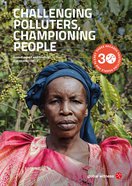
30 years of protecting people and planet
Annual Report 2023
Download report
Working in innovative ways
We remain true to the investigate/expose/advocate model that has been a hallmark of Global Witness’s greatest successes. But we have been evolving our approach within a culture of greater agility and innovation.
In the past two years, we have responded at speed and scale to shifts in the global landscape with start-up teams that shape the story and campaign for solutions.
In just a few days, we set up a project to stop Putin using Russian fossil fuels to finance his war on Ukraine.
Then, at the end of 2022, we created a Fossil Fuels Newsroom to challenge oil and gas companies’ profiteering while people struggled to pay their heating bills. Watching the newsroom establish itself and make its mark in the world has been a highlight of the past year.
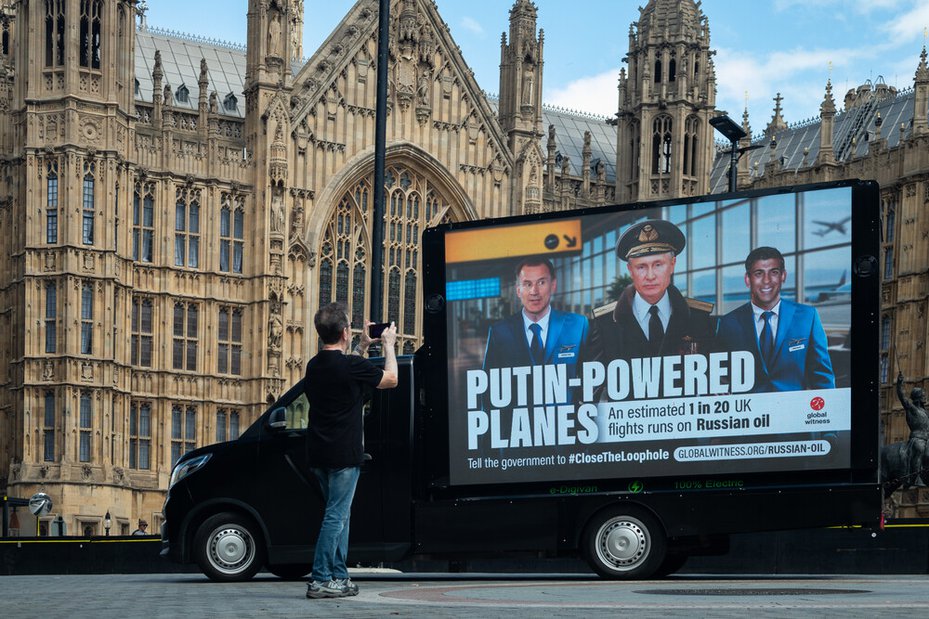
Billboard circulating London reveals that 1 in 20 UK flights are running on Russian oil. Luciana Dal Ri / Global Witness
Building powerful partnerships
We have begun placing much greater emphasis on collaboration. Partnership with civil society organisations demanding a genuinely just transition is central to the design of our new Transition Minerals campaign.
Recognising the critical role of Chinese companies and policymakers, we will make engagement in China a priority. But just as important is extending these relationships to partners in Africa and Asia.
Partnership has also underpinned the role we have played in campaigning for and shaping the EU’s Corporate Sustainability Due Diligence Directive – a new law designed to enable environmental defenders and communities around the world to hold companies accountable for their role in environmental and human rights abuses.
From the time we first persuaded the EU Commissioner to develop this law, through to it being debated in the European Parliament, we have ensured that environmental defenders from around the world are part of the discussion.
And while last-minute opposition meant the final legislation is a shadow of what it could have been, defenders’ voices were crucial to ensuring the law got through at all.
Telling compelling stories
We are broadening our range of investigative and storytelling methods. This includes expanding our outstanding Data Investigations team, who have so brilliantly exposed toxic rare earths mining in conflict-torn northern Myanmar, and the role of multinational meat companies in destroying the Amazon. We want all our teams to be able to draw on this kind of expertise.
Alongside this work, the campaigners and communications specialists in our new Brand and Creative team have been engaging our audiences in new ways, including viral videos that satirise the greed and outsize influence of some of the world’s biggest polluters.
For me, the best illustration of what Global Witness’s 30 years of experience delivered in 2023 was our work at the COP28 climate summit in Dubai. Using our data investigations capabilities, we – together with others in the Kick Big Polluters Out coalition – amplified the case for a commitment to phasing out oil, gas and coal by exposing that 2,456 fossil fuel lobbyists had been granted access to the negotiations.
This instantly became part of the public narrative of what was at stake at COP28 and the case for a phase-out of fossil fuels.
At the same time, half a dozen of us worked with partners from around the world to stage events to ensure that environmental defenders – rather than oil and gas lobbyists – are heard and heeded in climate conversations. Our work to highlight threats to defenders was constantly cited by participants throughout COP28.
The heightened awareness helped us, together with civil society organisations from Africa, Asia and Latin America, convene a meeting with governments on the need for defenders to have a seat at the table when it comes to climate decision-making. This initiative is nascent and very uncertain, but it has enormous potential.
Celebrating a trailblazing past
Global Witness’s 30th year was a pivotal one for another reason – it marked the last year with our trailblazing founders guiding us as Executive Directors.
Charmian Gooch, Patrick Alley and Simon Taylor established Global Witness to challenge the corrupting forces harming our planet and the people that most depend on it. They wanted to address the neglected relationship between environmental and human rights abuses.
Their high-stakes opening gambit used hidden cameras – and a cover story borrowed from a James Bond film – to expose how logging in Cambodia was sustaining the genocidal Khmer Rouge movement and the country’s civil war. The campaign cut the movement’s funding, which was running at $10-$20 million per month, and played a role in the group’s demise a couple of years later.
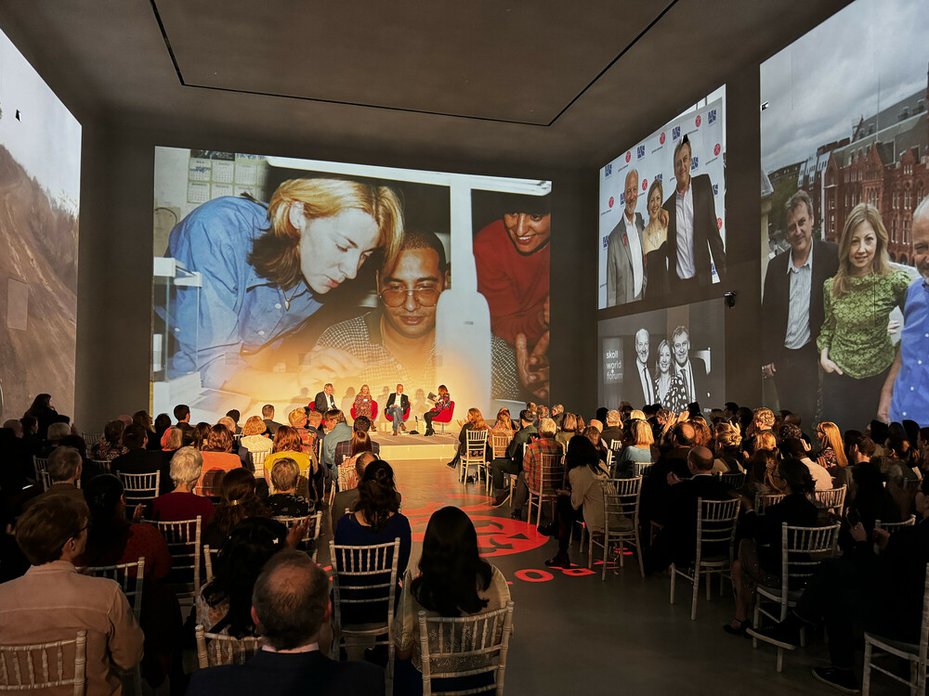
SIMON TAYLOR, CHARMIAN GOOCH AND PATRICK ALLEY (L-R), FOUNDERS OF GLOBAL WITNESS, ARE INTERVIEWED BY JOURNALIST KIRSTY LANG AT THE ORGANISATION'S 30TH ANNIVERSARY EVENT. LAI YUN / GLOBAL WITNESS
But that was the just the beginning. Charmian, Patrick and Simon went on to expose the scourge of blood diamonds, revealing that these precious stones – marketed as the ultimate expression of love – were financing deadly wars in countries like Angola, Sierra Leone and Liberia. Next, they showed how corruption in the oil, gas and mining industries was impoverishing and disempowering people in the Global South, and forced these industries to be more transparent.
Global Witness became known for its work to expose the global architecture of corruption that is woven into the extraction and exploitation of natural resources. In particular, this included the use of shell companies, which have disguised all the biggest resource heists in modern history, not least those targeting countries rich in transition minerals, such as the Democratic Republic of the Congo.
More than that, Charmian, Patrick and Simon built an organisation that has grown, thrived and is now responding to the biggest collision of environmental and human rights challenges the world has ever seen.
They remain members of our Global Witness board – now chaired by the amazing Kirsty Lang – so we are not letting them go far. But it is an important moment for us to mark their accomplishments and thank them. We appreciate them deeply for their inspirational example.
We also want to celebrate the opportunity they have created for so many others – members of the Global Witness team, past and present – to challenge abuses of power and campaign to change the world.
As we look ahead to the new challenges of 2024, I feel deeply grateful we have such a remarkable legacy of bold and innovative campaigning to inspire and drive forward everything we do
The ultra-powerful oil and gas industries are driving sky-high CO2 emissions, while using cosy relationships with political leaders to block urgent climate action.
At the same time, financiers are quietly bankrolling the destruction of forests, which devastates communities and erodes critical protection against climate breakdown.
We’re working to expose big polluters, disrupt funding flows and stop abuses of power to protect people and the planet.
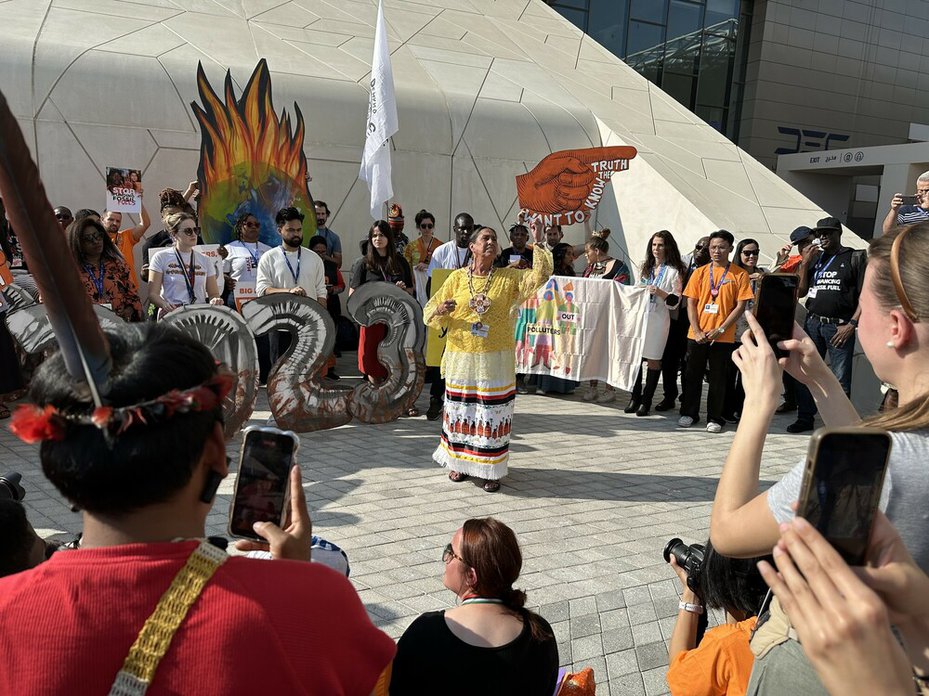
Picture caption: Activists protest at COP28 after the Kick Big Polluters Out coalition revealed that over 2,400 fossil fuel lobbyists were granted access to the conference. JASMINE QURESHI / GLOBAL WITNESS
Taking on the fossil fuel industry
Oil and gas companies have enforced a system that is driving up inequality, destroying the planet and fuelling Putin’s brutal war in Ukraine.
Last year, we used fast-turnaround investigations, storytelling, large-scale campaigning and political advocacy to stand up to fossil fuel giants. Our work aimed to expose the industry's damaging influence, call out businesses profiting from destruction, provoke public outrage and influence political decision-making.
Exposing how oil and gas drive inequality
Launched in response to the energy crisis in 2022, our Fossil Fuels Newsroom reached new audiences last year by exposing how companies’ vast profits are pushing up energy costs and fuelling human suffering.
When fossil fuel giants Shell, TotalEnergies, Chevron and BP published record earnings for 2022, we released powerful analysis that contrasted the companies’ gargantuan profits with the financial struggles of ordinary people, underlining the vast inequality at the heart of our energy system.
For example, we showed how BP’s record profits of £22.9bn could have paid the annual energy bills of a third of UK households.
When we highlighted Shell and BP bosses’ huge bonuses, our story was covered 1,000 times in two days, bringing our messages to people around the world
Spotlight: Using creative tactics to reach new audiences
Working with BAFTA-winning comedian Jolyon Rubinstein, we created three satirical videos targeting fossil fuel companies and executives.
The films highlighted BP and Shell’s record profits, Shell’s tiny tax bill and oil executives’ outsize political influence. This inventive approach sent a clear message to hundreds of thousands of people: they’re richer because we’re poorer.
We also overshadowed Shell’s AGM by hijacking its social media hashtag and publishing analysis that coloured UK media coverage of the event.
In July, our provocative OilyFans campaign turned controversy over adverts for the website OnlyFans into an opportunity to call out big oil. We rebranded billboards as "OilyFans" ads featuring BP’s then-CEO Bernard Looney, and calling out his “bulging” pay packet at a time when people couldn’t afford to heat their homes.
Using humour and reactive content delivered our message to new audiences: the story was picked up by UK tabloids and later the New York Post, and was the top post on Reddit for five hours.
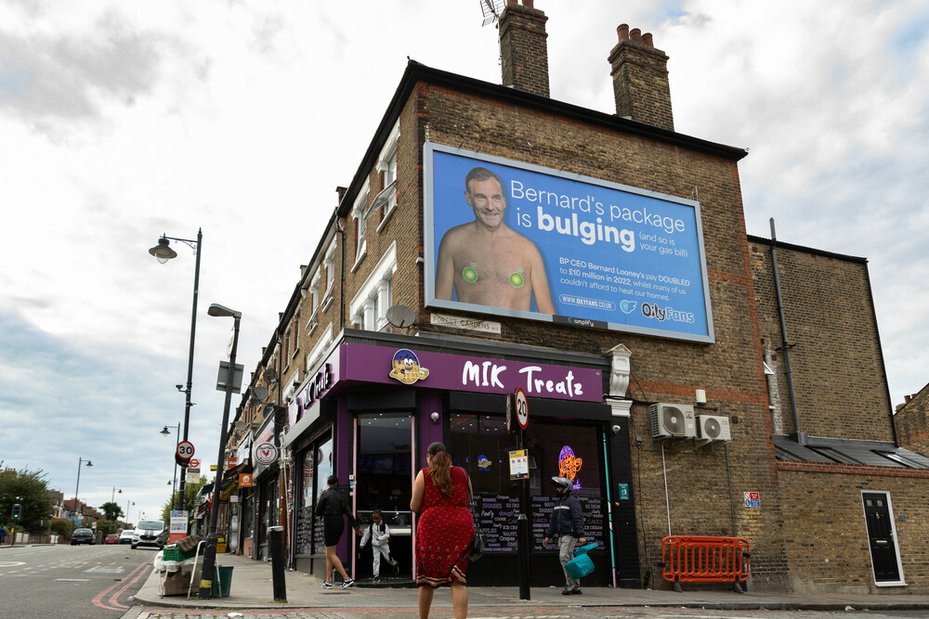
OilyFans Billboard of BP CEO Bernard Looney in Tottenham, London. Luciana Dal Ri / Global Witness
Cutting off Putin's oil income
In our campaign to expose how fossil fuels are funding Russia’s brutal war in Ukraine, we amplified partners’ calls for action.
In February, with evidence mounting that the G7 price cap wasn’t working, we joined Ukrainian civil society groups and climate organisations in demanding an outright ban on the trading of Russian oil.
In an op-ed in The Times, we magnified calls for a 100% tax by Western governments on proceeds from Russian fossil fuels.
And we called out companies that were profiting from Russian assets they had pledged to divest from or write down, showing that Western firms traded Russian oil worth an estimated $14.8 billion in the first year of the war.
Russia’s brutal war on Ukraine has entered its third year and while there have been some big sanctions shifts, these are still insufficient to stop the Russian fossil-fuelled war machine. Now, more than ever, we need the support of organisations like Global Witness to expose those profiting from the fossil fuels that fund the war.
Svitlana Romanko, Founder and Director, Razom We Stand
We kept up the pressure throughout the year with a steady drumbeat of coverage averaging a new media story every week, while our #FossilFuelsFundWar hashtag reached almost six million people.
We also shone a light on the failure of UK, EU and US sanctions on Russian oil due to legal loopholes. As well as publishing an investigation into Shell and Vitol’s activities in Europe, we contributed to a BBC radio programme tracing the journey of a barrel of Russian oil to the UK, and revealed on BBC Newsnight that UK imports of refined products from Russian oil represented £40 million in taxes to Putin’s regime.
We’re now working closely with UK politicians to close the loophole.
And in the EU, following our research into proposals to replace piped Russian gas with liquefied natural gas (LNG), the European Parliament called for a full ban on Russian LNG and for the EU to close the refining loophole in its sanctions regime.
In June, our analysis of US imports containing Russian oil was covered in the New York Times. We then worked with Congressman Doggett to get bipartisan legislation into Congress, supported by 51 members.
To underscore the urgency of the issue, we published an investigation showing that US imports of fuels made from Russian oil were worth $180 million to the Kremlin in tax revenue – enough to buy 8,600 of a type of drone used to bombard Kyiv.
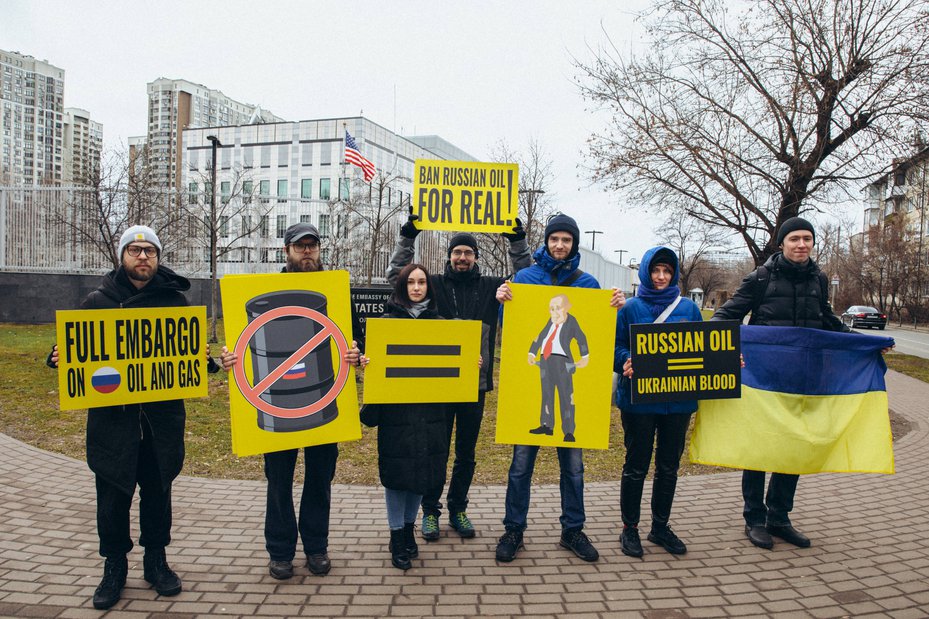
Ukrainian activists hold a banner calling for a complete ban on the trade of Russian at the US Embassy in Kyiv. Anna Soshnikova
Spotlight: Fighting fossil fuel greenwashing
For decades, the fossil fuel industry set out to deny climate change. But faced with public outcries and undeniable science, they’ve been forced to change tack – and are now peddling false solutions. This year, we’ve blocked efforts to sneak fossil gas into renewables targets and held the industry to account for misleading claims about its spending.
With the EU revising its green energy targets to boost the roll-out of renewables, the fossil fuel lobby had been pushing hard for "blue hydrogen" – a fuel made from climate-wrecking fossil gas – to be included. We worked with NGOs and progressive energy companies to block these efforts, and the final deal didn’t include blue hydrogen – a crucial win for the climate.
However, heavy pushing from France meant that non-renewable nuclear based hydrogen made it into the law. We’re now keeping up the fight to ensure this doesn’t set a dangerous precedent for future renewable energy policies.
In the US, we submitted a groundbreaking complaint to the financial regulator accusing Shell of misleading authorities and investors about its energy transition efforts.
Although Shell claimed 12% of its expenditure went on “Renewables and Energy Solutions”, we estimated that only 1.5% was used for solar and wind power, while a significant portion went into investments in fossil gas.
In the interests of a just transition to renewable energy, we’ve called on the regulator to investigate Shell’s greenwashing of its gas investments and find out if any laws were broken.
Tackling the financiers banking on deforestation
By investing in the companies driving deforestation, financial institutions have a huge hidden role in the degradation of forests that are central to people’s lives and livelihoods, and critical for our climate.
We’re exposing banks’ and financiers’ links to forest destruction, lobbying them to end harmful investments and pushing for stricter laws to stop deforestation.
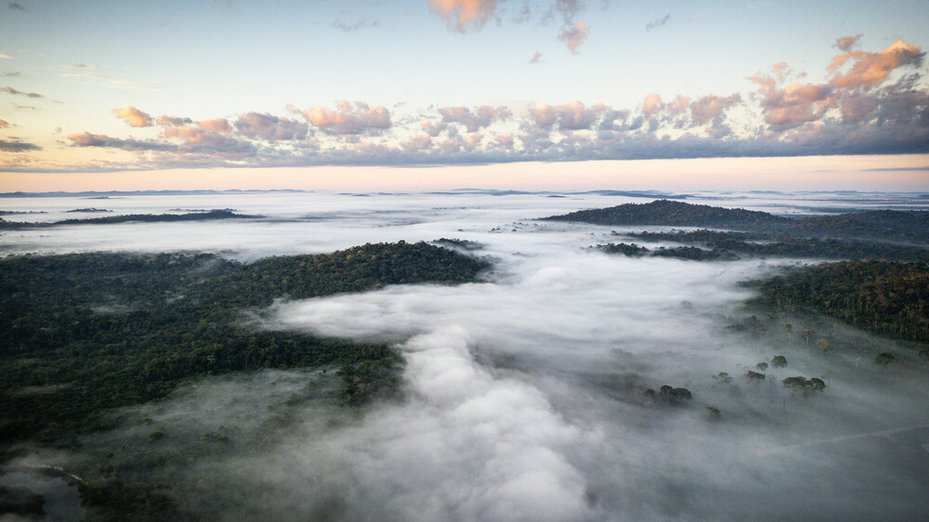
We're following the money from big banks and financial institutions to the destruction of climate critical tropical forests. Cícero Pedrosa Neto / Global Witness
With a new financial services bill going through the UK Parliament, we drafted an amendment to make it mandatory for banks and financiers to check their investments aren’t driving deforestation.
Twelve financial bodies worth a combined £2.7 trillion signed a joint letter of support and the House of Lords voted in favour, with Baroness Boycott citing our “investigations and savvy campaign” as being integral to the win.
Ultimately the amendment, which was selected as a parliamentary “highlight” of the year, resulted in a Treasury review of deforestation finance – a historic achievement. This puts the UK in line with the EU, where our campaigning in 2022 achieved a similar outcome.
November marked two years since a UK law was signed to prevent imports from illegally deforested land. Yet it still wasn’t in force because the Department for Environment, Food and Rural Affairs hadn’t published a list of banned products.
At SUMAÚMA, we are journalists who report on the world from the perspective of the Brazilian Amazon and its peoples. With the support of Global Witness, SUMAÚMA is amplifying the voices from indigenous people who are on the front line of deforestation and climate change
Jonathan Watts, Co-founder, SUMAÚMA
To ramp up the pressure for action, we released widely reported research with Trase showing that, since 2021, deforestation covering land twice the size of Paris was linked to UK imports of key commodities, including palm oil and beef.
With seven supermarkets also speaking out, the government finally announced a list of prohibited products. We’re now pushing for the ban to be implemented as soon as possible, and calling for even tighter regulation.
2023 saw policy progress in the US too. Following strategic advocacy work, the State Department’s initial report on tackling deforestation, including the role of traders and financial institutions, reflected our key messages.
And, as a result of our 2020 investigation into Amazon destruction, the Senate Finance Committee launched a hearing into JBS’ supply chain and financing in Brazil’s beef sector.
Our storytelling laboratory called Micélio supports the participation of 14 young people (indigenous, quilombolas, riverine, and small farmers). And with our Radio SUMAÚMA podcast, our first season featured 15 episodes, presented by two important voices from the Amazon rainforest: the indigenous journalist Elizângela Baré and riverside dweller Maickson Serrão
Jonathan Watts, Co-founder, SUMAÚMA
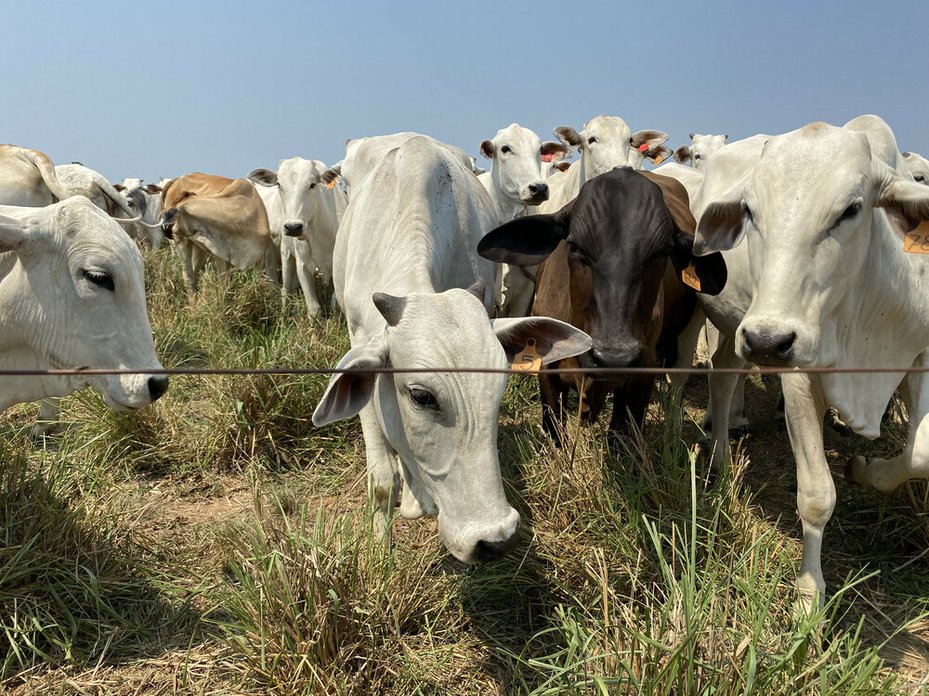
Cattle ranch in Brazil's Mato Grosso state, where Global Witness has linked illegal deforestation to multiple global meatpackers. Global Witness
Spotlight: The Big Beef Watch
JBS, the world’s largest meat producer, is financed by HSBC, BlackRock and other major banks, despite being linked to widespread forest destruction in the Amazon. To challenge the company’s claims that it can’t track deforestation in its indirect supply chain, we launched the Brazil Big Beef Watch bot on Twitter (now X).
When public deforestation alerts were issued for the state of Pará, the bot cross-referenced data on cattle transport and land ownership to see if the event involved a farm in JBS’ indirect supply chain. If so, it tweeted a "#DeforestAlert" tagging JBS, which showed the area of land deforested and how many cattle the farm had sold to the company’s suppliers.
This cutting-edge, data-driven approach turned up the heat on JBS to clean up its operations. And in June, it was cited by Baroness Sheehan in the House of Lords, in comments about the need for banks to be legally required to check they’re not funding deforestation.
Following the success of Brazil Big Beef Watch, we plan to scale up our data investigation capacity to do more of this work.
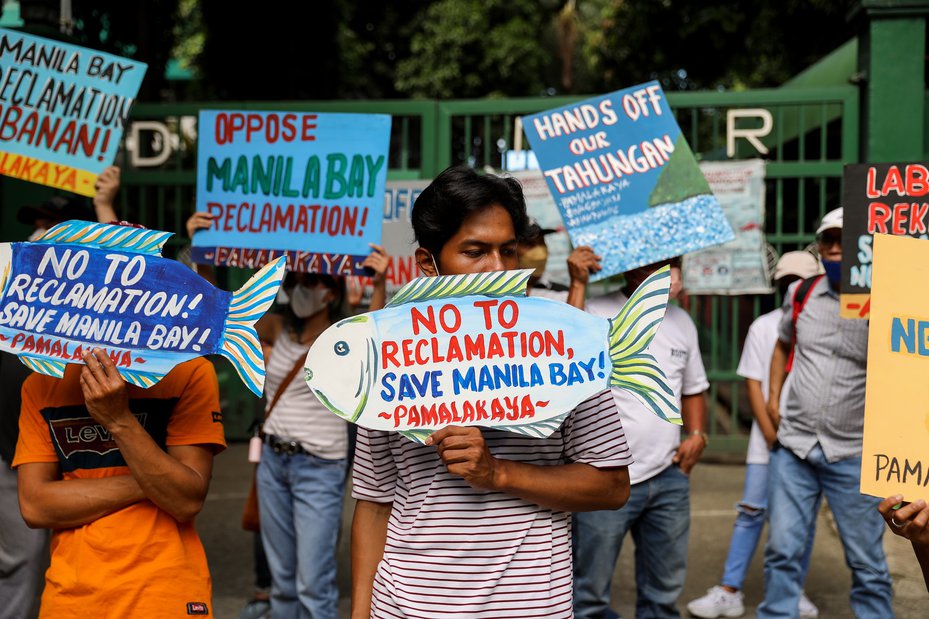
Protests against development projects in Manila Bay, Philippines 2022. Basilio Sepe / Global Witness
We’re fighting to put the future of our planet in the hands of people and communities, not corporations. That means bringing those on the front lines of the climate crisis into the heart of decision-making – this is the only way to build a just and equal world, and to find truly sustainable solutions.
And with hate and disinformation poisoning online spaces, we’re taking on Big Tech to safeguard the healthy democracies we urgently need to progress climate action.
Land and environmental defenders
Every day, people who defend human rights and our environment are harassed, threatened or even killed. These are ordinary people speaking out to stop new oil and gas projects, oppose harmful mining operations, safeguard our forests and protect their livelihoods.
We’ve been tracking the relentless killings of land and environmental defenders, and honouring their courageous work, for over a decade.
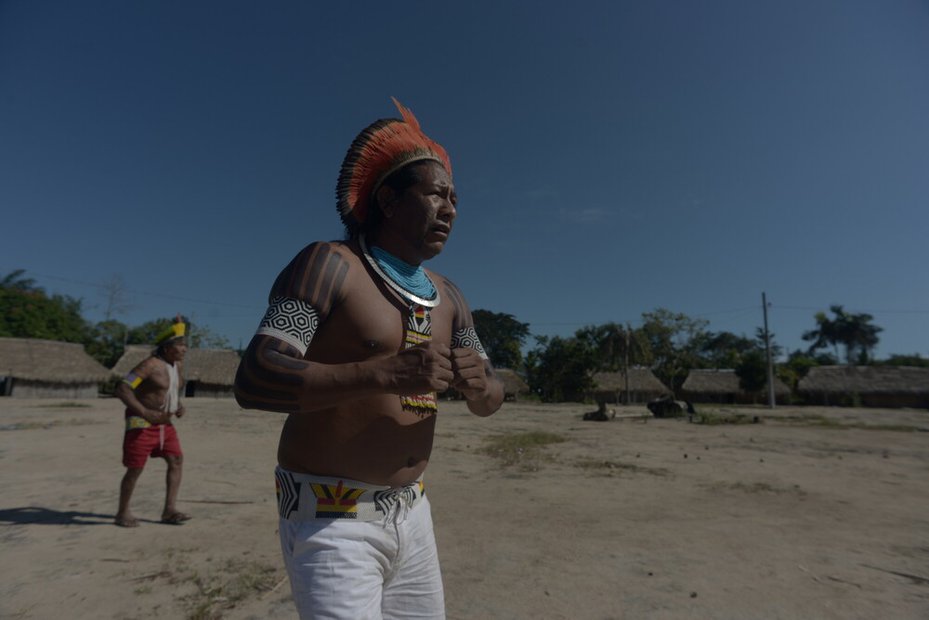
CACIQUE BEPDJO [RIGHT], INDIGENOUS LEADER FROM THE KAYAPÓ COMMUNITY, PERFORMS SINGING AND DANCING AROUND BAÚ VILLAGE, PARÁ, BRAZIL. KARINA ILIESCU / GLOBAL WITNESS
In September, we revealed that at least 177 defenders were murdered for standing up to harmful industries in 2022. Our data showed that 36% of those killed were Indigenous peoples, and 60 people lost their lives in Colombia alone.
Within 48 hours, the report had been covered in 1,600 news articles, taking our message around the world. Colombia's environment minister, Susana Muhamad, responded in a video statement calling for the ratification of a landmark regional agreement giving defenders greater protection.
We know our data doesn’t include every person killed for protecting our environment, so we’re now expanding the scope of this work.
We also undertook research around specific activists and communities. As the European Parliament debated new legislation to make companies accountable for harm to people in their supply chains, we released two influential investigations
Both reports showed the urgent need for consultation and safety measures for defenders, revealing how people affected by a $15 billion airport development in the Philippines and a "toxic" landfill in Colombia had been subjected to threats and coercion.
Our work fed into EU discussions and was shared on social media by a lead MEP on the environment.
In December, to coincide with an event on fossil fuels in Africa at COP28, we exposed the human rights abuses faced by communities in the path of the East African Crude Oil Pipeline (EACOP).
When our partners raised the report’s findings with TotalEnergies Chief Executive Patrick Pouyanné at COP28, he publicly committed to working for the release of seven activists imprisoned in Uganda for protesting EACOP.
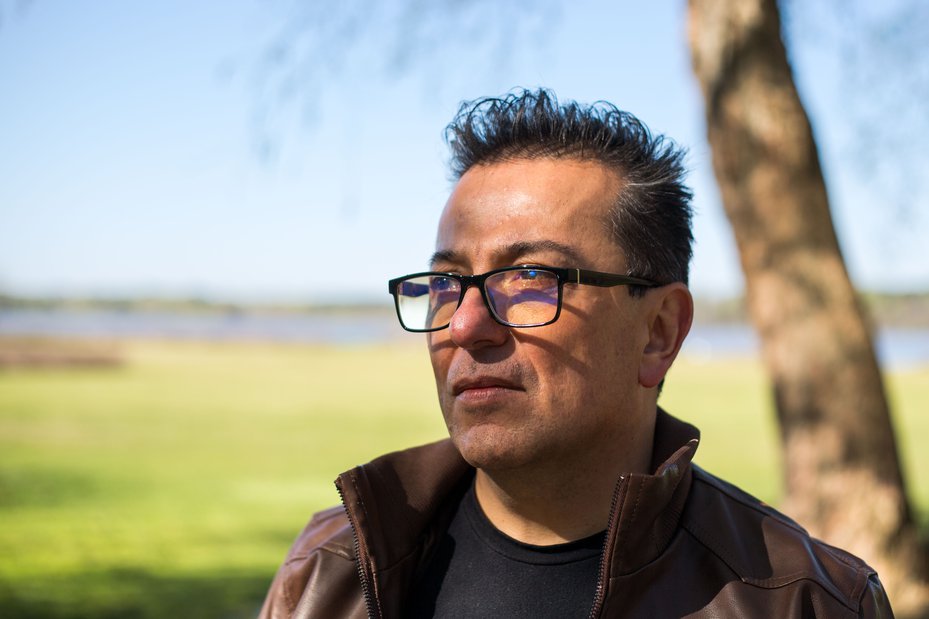
Paediatrician Yesid Blanco has documented shocking health impacts of children in and around the Patio Bonito community since the landfill began operations
I became aware of attempts to imprison me, and even of a plan for hitmen to attack me and my family
Dr Yesid Blanco
Spotlight: Exiled for speaking up about a toxic landfill
Dr Yesid Blanco is a Colombian paediatrician who shared his story in our Standing Firm report on land and environmental defenders. He was forced to flee to the US after speaking out against a toxic landfill he says was harming local people.
Dr Blanco first thought something was wrong when children began to come to him with “peculiar and horrifying issues” he had never seen before. It was clear to him that a local landfill was contaminating the community’s food and water. After speaking out, he began receiving death threats and was forced into exile.
“I became aware of attempts to imprison me, and even of a plan for hitmen to attack me and my family.”
In 2019, the landfill was bought by French waste management company Veolia. Dr Blanco says he warned the company about his concerns, but the sale still went through.
“The European Union must act and apply pressure so that companies like Veolia do not purchase assets like this landfill – and that environmental, economic and social organisations also have the power to stop this from happening."
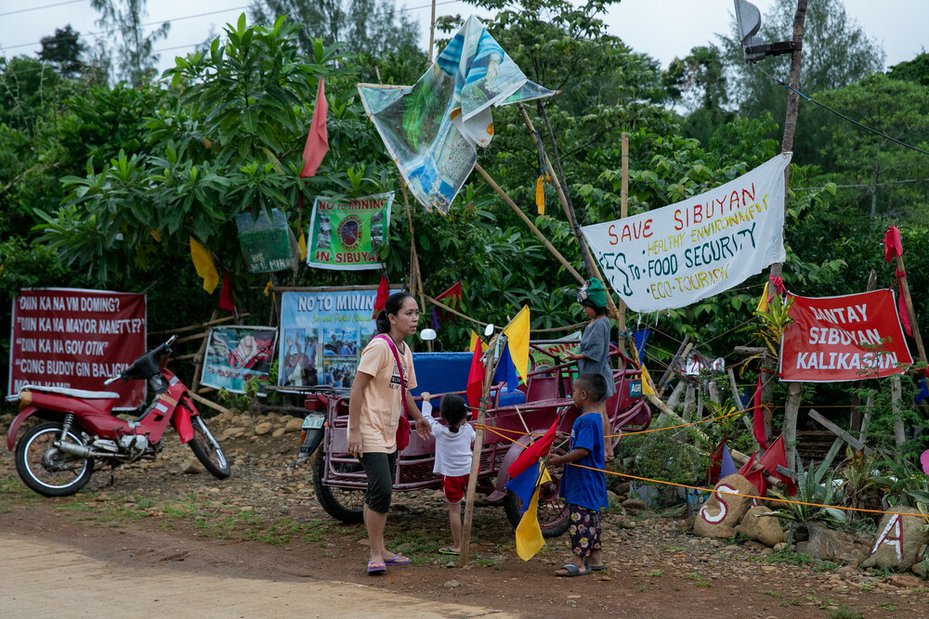
RESIDENTS WALK PAST SIGNS OUTSIDE A PROTEST CAMP IN SIBUYAN ISLAND, ROMBLON PROVINCE, CENTRAL PHILIPPINES. BASILIO SEPE / GLOBAL WITNESS
It really hurts us a lot because this island is ours. They don’t own it and yet they are destroying it
Charles Rocil, nature ambassador
Spotlight: Defenders' role in a just transition
The world must switch to renewable energy in a way that respects, protects and involves – not exploits – land and environmental defenders, activists and communities. But while wealthy governments are pledging billions to help fund a just transition, we’ve found that they’re failing to stop the intimidation and arrest of activists.
We revealed that G7 countries and others have pledged $15.5 billion to help Vietnam reduce its emissions as part of a Just Energy Transition Partnership. Yet the country’s environmental defenders face criminalisation, and three activists are in jail there after speaking out for clean energy.
We believe that a just transition can only happen if civil society has a meaningful role in shaping it – and campaigners can speak out without fear of reprisals.
This also applies to the boom in mining for minerals used in renewable technology. Sibuyan, in the Philippines, is a biodiversity hotspot where environmental defenders have faced intimidation and abuse for trying to stop a devastating nickel ore mining project.
Nature ambassador Charles Rocil explains, “It really hurts us a lot because this island is ours. They don’t own it and yet they are destroying it.”
By foregrounding stories and voices from communities like Sibuyan, we’re showing the human impact of exploitative practices.
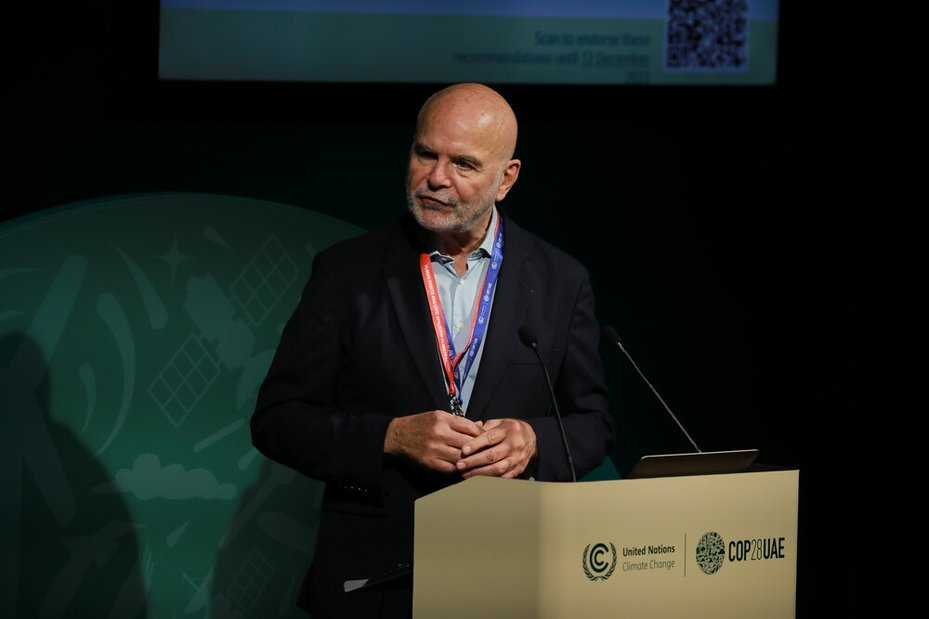
MICHEL FORST, UN Special Rapporteur on Environmental Defenders under the Aarhus Convention, SPEAKS AT AN EVENT ABOUT LAND AND ENVIRONMENTAL DEFENDERS CO-ORGANISED BY GLOBAL WITNESS AT COP28, IN DUBAI, UAE. LAI YUN / GLOBAL WITNESS
Global Witness definitely stands out as a 'friend of the mandate', on which I know I can rely in the years to come
Michel Forst, UN Special Rapporteur on Environmental Defenders under the Aarhus Convention, United Nations
“For years, Global Witness has been a key ally for my work as Special Rapporteur on Human Rights Defenders. The annual Defenders Report has played a key role over the last decade in elevating together the issue of protection for environmental defenders, in international fora, thanks to a strong evidence-based advocacy.
“Today, in my new role as Special Rapporteur on Environmental Defenders, Global Witness definitely stands out as a ‘friend of the mandate’, on which I know I can rely in the years to come, to continue to advance the protection of environmental defenders.
“Beyond the work I conduct under my mandate, I will personally always look back at my cooperation with Global Witness and its incredible staff as a relationship that profoundly marked my engagement, my work and my vision for the protection of environmental defenders.”
– Michel Forst, UN Special Rapporteur on Environmental Defenders under the Aarhus Convention, United Nations
Holding corporations to account
The EU’s Corporate Sustainability Due Diligence Directive was conceived to empower communities around the world to take companies to court and help stop businesses profiting from wrecking the planet. Global Witness and partners have spent years campaigning for a robust law, leading to a milestone vote in December 2023.
In March 2024, last-minute interventions resulted in a diluted agreement that will profoundly limit the law’s power – but the fact it exists at all is due to our collective campaigning.
Throughout last year, with some countries seeking to derail the directive, we pushed hard for the strongest legislation possible. As the law made its way through the European Parliament, we provided evidence and arguments to support amendments
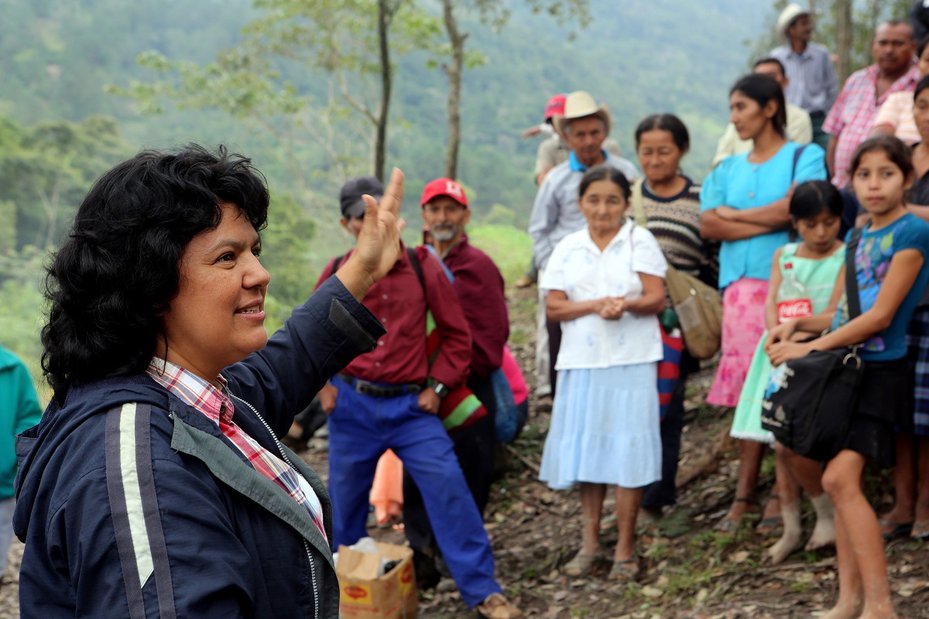
Honduran activist Berta Cáceres was murdered in 2016 after resisting a new dam project supported by EU banks. Goldman Environmental Prize
As well as publishing two investigations relating to land and environmental defenders, we produced five briefings specifically designed to resonate with a business-minded audience. In the autumn, we released a public campaign video stressing the need for a law to force oil companies to drop fossil fuels.
To show why financial institutions must be included in the law, we highlighted the 2016 killing of Honduran activist Berta Cáceres while resisting a dam project bankrolled by EU financiers. Later in the year, we wrote an open letter to EU states calling for them to back human rights and environmental rules for the financial sector.
Then in November, we revealed how European banks and investors were investing over €700 million in two companies helping to fuel violence against people in South Sudan. As the final decision approached, we coordinated an open letter from high profile NGO directors pressing EU Commissioner Reynders to see through a robust law.
[Global Witness] have been tirelessly pushing to ensure that policymakers put people and planet above profits. Their work has been essential to getting a groundbreaking EU law that could bring justice to communities across the globe – the Corporate Sustainability Due Diligence Directive – over the line
Marie Toussaint, MEP, Greens/EFA
The deal voted on in December reflected several of our key asks, although it only included limited regulations on financiers. Crucially, it enables communities anywhere to sue companies in European courts, requires businesses – including fossil fuel giants – to implement climate transition plans, and compels companies to engage with affected communities.
This legislation was set to be a landmark win after years of campaigning. But in March 2024, pushback at the eleventh hour substantially weakened the agreement. The final law applies to two-thirds fewer companies and gives most businesses five years before new rules apply.
While this isn’t the law we wanted, it’s been a hard-won fight to get it voted through at all, and this legislation will still give some hope and power to communities around the world.
Transition minerals
As the renewables boom accelerates, the race has begun to extract critical minerals and rare metals used in everything from batteries to wind turbines. With 60-80% of these transition minerals located in Indigenous lands, it’s crucial we prevent abusive practices, avoid repeating past colonial exploitation and ensure a just transition that puts people first.
Clean tech has a key role to play in combatting the climate crisis, but materials must be sourced using responsible mining practices. We spent 2023 putting strong foundations in place for our work to ensure that any extractive projects respect human rights and the environment.
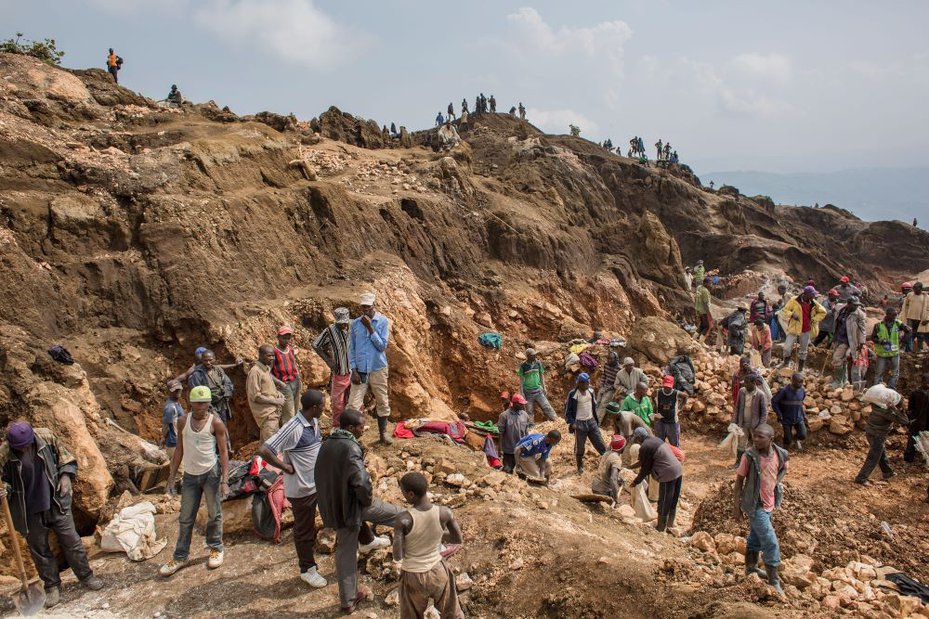
mine in the Democratic Republic of Congo. Erberto Zani / Alamy Stock Photo
Since China is the dominant global player in refining transition minerals, we began strategic advocacy to encourage Chinese companies and government agencies to follow best practices. This included connecting civil society groups with Chinese industry and decision-makers to develop effective complaints processes for workers and communities.
We also showed how mineral extraction can have a devastating impact on people and the planet.
In November, our investigation revealed that the rush for lithium in Africa risks damaging the environment and harming communities. Focusing on three mines in the Democratic Republic of Congo, Namibia and Zimbabwe, we highlighted allegations of corruption, human rights violations and environmental abuses.
As the transition to renewables intensifies, this work will be more important than ever. We’ll use our expertise in mining and natural resources to build powerful partnerships to advocate for system change. Our research will continue to expose the human cost of the rush for minerals and amplify the voices of those affected.
We’ll call on consumer nations to make sure supply chains follow the highest human rights and environmental standards. And we’ll push for countries in Africa, Asia and Latin America to have more control of the process.
The work between AFREWATCH and Global Witness on energy transition in 2023 has been of great importance, not only in enabling civil society representatives from African countries to exchange views on the notion of a just and equitable transition, but also in producing a study with the priorities of southern countries on just and equitable transition.
Emmanuel Umpula, Executive Director of African Natural Resources Watch/AFREWATCH
New York Climate Week
Against a backdrop of rapid warming and multiple global crises, we joined New York Climate Week (NYCW) to build community and stand with people most affected by the climate emergency. Timed to coincide with the UN General Assembly, the event brought civil society, business and governments together for hundreds of panels, conferences and conversations around climate action.
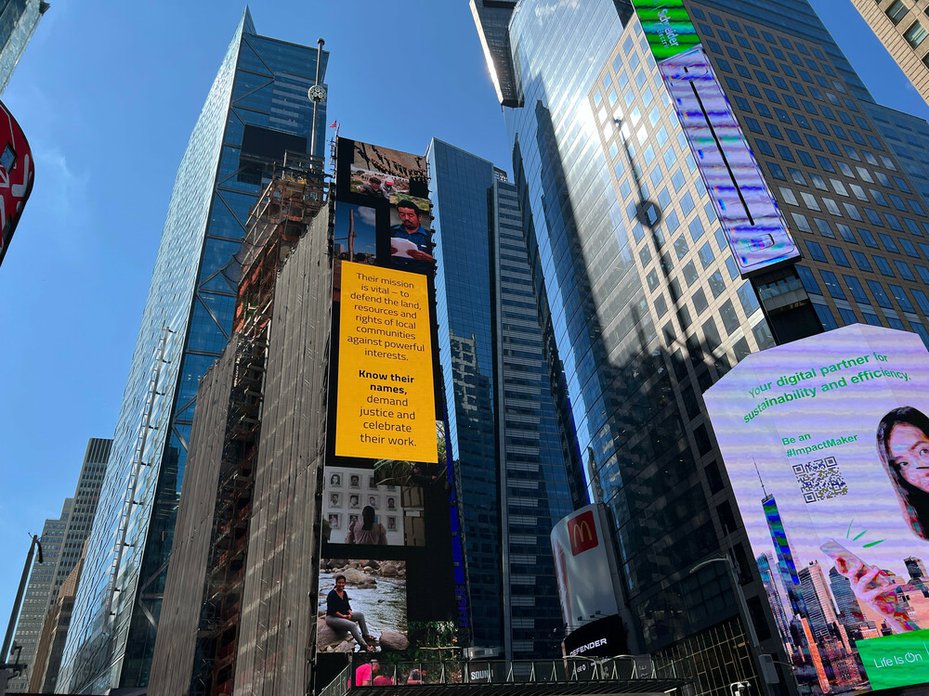
GLOBAL WITNESS' BILLBOARD IN NEW YORK TIMES SQUARE TO COMMEMORATE MURDERED LAND AND ENVIRONMENTAL DEFENDERS, IN NEW YORK CITY, US. GLOBAL WITNESS / YEA! IMPACT
As governments met at the UN Climate Ambition Summit, we co-hosted an event focused on the need to ramp up recognition and protection of the land and environmental defenders at the forefront of the climate crisis.
Speakers included Joan Carling, Indigenous Filipino human rights activist; Vanessa Nakate, Ugandan climate justice activist and author; Juan Manuel Santos, former President of Colombia; Ambassador Norberto Moretti, Brazil’s Deputy Permanent Representative to the UN; Michel Forst, UN Special Rapporteur on Environmental Defenders under the Aarhus Convention; and Martín Abregú, Vice President of the Ford Foundation.
As part of the UN’s Women Rise For All initiative, Shruti Suresh, our Co-Director of Campaigns, spoke at a UN event on the role of defenders and civil society in tackling the climate crisis and achieving the Sustainable Development Goals. We also used NYCW events to highlight the impact of online hate on climate scientists and activists.
Publicly, we shone a light on the deadly risks defenders face. Paying tribute to each person murdered for protecting our planet since 2012, we took out a full-page advert in the New York Times and a billboard in Times Square listing their names.
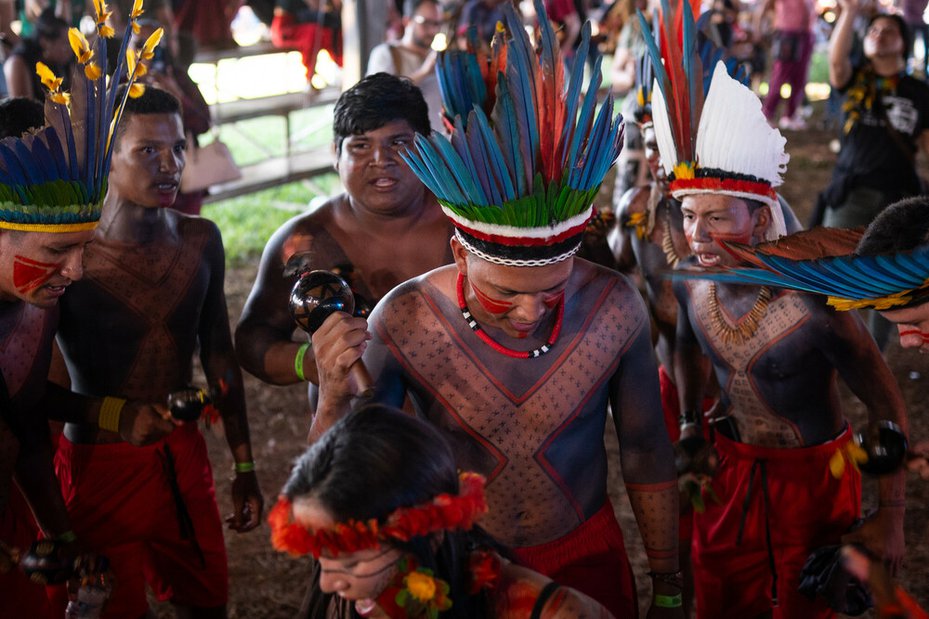
Thousands of Indigenous leaders and representatives converged in Brasília for the 20th Free Land Camp (Acampamento Terra Livre), a major annual mobilisation that amplifies Indigenous resistance. Cícero Pedrosa Neto / Global Witness
Spotlight: Leveraging our networks to advocate for change
To achieve our goal of building people power, we bring partners together to help shape our strategy and vision, and use our networks to increase recognition for their work. Since early 2023, we have been working with partners to co-create the Leaders Network for Environmental Activists and Defenders (LEAD).
This will facilitate dialogue between environmental defenders on the frontlines of the climate crisis and leaders from governments, academia, the media, international institutions and eventually the private sector, with support from civil society organisations.
LEAD aims to increase awareness of defenders’ role and the threats they face, enhance data on attacks against defenders, and enable the sharing of best practices to protect them and promote their participation.
It is a space to review and build on existing commitments, and a huge opportunity to make defenders part of developing climate solutions and enabling a just energy transition.
To cement support for LEAD among governments, we co-organised two meetings in 2023, working closely with our defender partners, the UN Special Rapporteur on Environmental Defenders under the Aarhus Convention, and civil society organisations from around the world. During New York Climate Week and COP28, we brought together key parties to discuss critical gaps and a way forward for defenders. LEAD will be a major focus of our work for 2024.
As part of our goal to grow our partner network across Asia, we helped gather 150 defenders from across the region at the UN Asia-Pacific Forum on Environmental and Human Rights Defenders.
We also supported seven defenders to attend from the Philippines, Indonesia, India and Myanmar, and organised a series of panel discussions and film screenings.
Digital threats to democracy
To tackle the climate crisis while protecting people and the environment, we need healthy democracies. But online hate and disinformation are silencing crucial voices, poisoning public debate and damaging trust in institutions.
We’re pushing for robust laws and oversight to stop Big Tech companies amplifying harmful trends and profiting from divisive content.
In 2023, we continued to test social media safeguards by submitting ads containing hate speech for approval on Facebook, YouTube and TikTok.
In one investigation into anti-LGBTQ+ messaging in Ireland, and another targeting refugees in South Africa, almost every ad got through the platforms’ checks.
On the International Day of Democracy in September, we launched an online map outlining findings from 10 similar tests we’ve carried out around the world. We’ve been told it’s been studied by both Meta’s Human Rights team and the Office of the Under-Secretary-General for UN Global Communications.
Events last year also demonstrated the power of our research to push leaders to spearhead change.
Following our earlier investigation into social media and Brazil’s elections, President Lula committed to outlawing anti-democratic ads, which is an important win but the approach taken must respect people’s rights.
In the US, TikTok’s Chief Executive Shou Zi Chew, was questioned by Congress about the platform’s failure to block nine in 10 election disinformation ads we tested in 2022. With the spotlight on him, Chew promised to review our report and respond.
And, as a result of our complaints to regulators, Meta will be made to answer questions in the EU around possible gender bias in its algorithms for the first time.
In 2024, 65 elections are due to take place globally and two billion people are expected to vote. With partners, we will push social media companies to enforce safeguards to stop hate and fake news around elections in countries that are critical to climate action.
We’ll also stress test new EU legislation to ensure Big Tech’s products respect human rights. And we’ll continue to study social media and AI’s role in climate disinformation, and how online abuse affects environmental defenders – two strands of work that were referenced in the UN Secretary General’s 2023 policy brief on digital platforms.
Spotlight: Online abuse of climate scientists
Scientists’ research into climate change is vital to our understanding of the crisis we face, and their findings underpin governments’ decisions on what action to take. But we discovered that scientists are subjected to online harassment that harms their health, and threatens climate research, debate and solutions.
Our survey of 468 climate scientists worldwide found that half of those who had published more than 10 journal articles had faced online abuse, and women were more likely to be threatened with violence.
Of these, 32% of women had experienced sleep problems, 21% of scientists had experienced depression and 8% had received death threats.
As well as the personal toll it takes, online hate is stifling crucial climate conversations: 41% of scientists said abuse made them less likely to post on social media about climate issues.
We called on social media companies to improve moderation, allow oversight of their algorithms and commit to respecting people’s rights and safety.
I have had first-hand experience of the vicious online harassment and abuse against climate scientists – from trolling to personal attacks aimed at discrediting my work and legitimacy. Thanks to Global Witness’ work shining a light on the scale of this abuse, there is growing appreciation of the global nature of this problem and the need for action by social media companies
Professor Mark Maslin, Pro-Vice-Provost of the UCL Climate Crisis Grand Challenge
The 28th Conference of the Parties to the UN Framework Convention on Climate Change (COP28) was held in the United Arab Emirates in December.
In the run-up, we published our policy positions, stressing the need to put people before profits and protect environmental defenders. We also pushed for human rights to be part of a global report card on countries’ progress on reducing emissions.
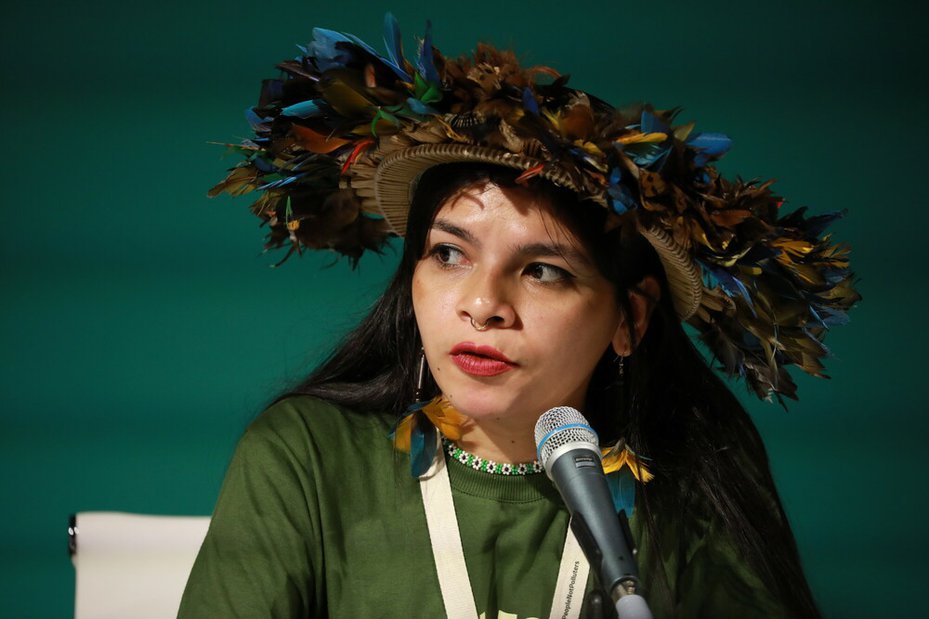
Txai Suruí, Indigenous climate activist from Brazil, speaks at an event about land and environmental defenders co-organised by Global Witness at COP28, in Dubai, UAE, on 3 December 2023. Lai Yun / Global Witness
At a COP headed by UAE oil boss Sultan Al Jaber, we built a pervasive media narrative around fossil fuel companies’ dominance at the conference.
A week before the event, we released the news that Al Jaber’s firm, ADNOC, would be the world’s second largest oil producer by 2050.
Days later, in partnership with the Kick Big Polluters Out coalition, we revealed that 2,456 fossil fuel lobbyists were granted access to the summit. This was nearly four times the figure for 2022, and far outstripped the 1,509 people who received passes from the ten most climate-vulnerable nations.
Our analysis made headlines around the world, intensifying scrutiny of oil and gas companies’ influence and upping the pressure for a meaningful outcome from the summit.
At COP28 itself, we promoted accountability and a just transition from fossil fuels, running five events with partners. Topics included land and environmental defenders, solutions to global deforestation, taking a people-focused approach to the energy transition, the effect of mineral extraction on communities and the imprisonment of climate leaders in Vietnam.
For the first time, the final COP agreement mentioned the need to reduce fossil fuel use. This is significant progress and a hard-won victory for activists.
But it’s also a frustrating failure to acknowledge the truth: we must urgently phase out fossil fuels, and rich countries and big polluters must financially support the transition.
Our thoughts are now turning to COP29. With Azerbaijan – another petrostate – set to host, we’re developing new investigations, analysis and campaigns to disrupt the influence of big polluters and bring people on the frontlines of the climate crisis into the heart of negotiations.
Spotlight: Amplifying activists' voices
Throughout COP28, we worked to foreground the views and experiences of Indigenous peoples and environmental defenders from countries hard-hit by the climate crisis. Speakers at our events included activists Evelyn Acham (Uganda), Mutuso Dhliwayo (Zimbabwe), Vanessa Nakate (Uganda), Txai Suruí (Brazil) and Mitzi Jonelle Tan (Philippines).
We supported partners from around the world to attend COP28 to speak at events, join protests, meet with policy advisors and collaborate with other campaigners and organisations. Our team helped Brazilian organisation We Are Guardians to screen their film and host two events, and we published a blog by reporter Claudia Antunes from the ‘forest first’ journalism platform SUMAÚMA.
As part of our #PeopleNotPolluters campaign on social media, we published a series of videos featuring activists from around the globe to help make their voices heard. Speakers from countries including Brazil, Kenya and the Democratic Republic of Congo outlined their hopes for the summit.
- Dismantling the political power of the oil and gas industry, using the model piloted through our work on Russian oil to reconfigure our work for even greater impact.
- Shaping best practice for the mining of transition minerals and providing greater support for our partners in producer countries.
- Researching and boosting our storytelling capacity to bring to light the broad range of attacks faced by environmental defenders, and to increase recognition for their work in the context of a just transition to green energy.
- Scoping a strategic approach to tackle online climate disinformation, which is an increasingly significant barrier to a green energy transition.
- Increasing our capacity in data-driven investigations and strategic communications across the board.
- Preparing for COP30 by boosting our presence in Brazil, so we can work with environmental defenders and governments towards recognising the work that defenders do to protect our climate.
- Bringing in a new learning and evaluation model that looks into feminist ways of working.
Collaboration is central to the success of everything we do. We partner with individuals, groups, networks and communities around the world, as well as international campaigning organisations.
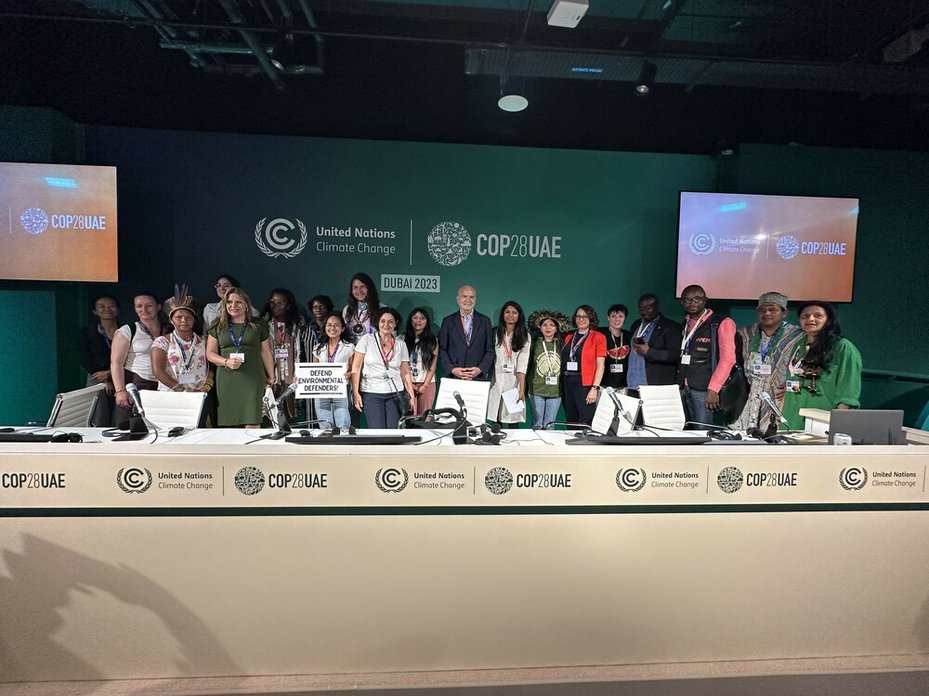
Activists, civil society and others pose for a photo after an event about land and environmental defenders co-organised by Global Witness at COP28 in Dubai, UAE, on 3 December 2023. Lai Yun / Global Witness
It’s only through effective partnership that we can truly transfer power from polluters to people. But as our strategic direction has shifted – for example, our changing role in the climate movement and our increased use of fast-turnaround investigations – we need to adapt the ways in which we work with others.
In 2023, we began an important journey to reflect on our partnership work. In consultation with partners and others, we’re working to develop solutions that put the needs of those we work with front and centre.
We’re looking at our culture as collaborators, our ways of working and communicating, and the core skills our teams need to forge strong partnerships. As we find answers and test out new approaches, we’ll listen closely to partners’ feedback to inform our next steps.
We appreciate all of our donors who make our work possible.
With thanks to:
- Arcadia
- Arcus Foundation
- Brook Foundation
- Camille Massey
- CHARISMA Stiftung für nachhaltige Entwicklung
- The David and Lucile Packard Foundation
- Department of Foreign Affairs and Trade of Ireland
- Don Quixote II Foundation
- The EQ Foundation
- European Climate Foundation
- Evan Cornish Foundation
- FJC – A Foundation of Philanthropic Funds
- Flora Family Foundation
- Ford Foundation
- The Frederick Mulder Foundation
- The Jeremy and Hannelore Grantham Environmental Trust
- The Grantham Foundation for the Protection of the Environment
- Holdfast Collective
- Humanity United Action
- The Isocrates Foundation
- Jane Thurnell-Read
- Jocarno Fund
- Kenneth Miller Trust
- Laudes Foundation
- Luminate
- Michael Hokenson
- The Minor Foundation for Major Challenges
- Nationale Postcode Loterij
- Norwegian Agency for Development Cooperation (NORAD)
- Oak Foundation
- Oliver Hudson
- Open Society Foundations
- Postcode Justice Trust, supported by players of People’s Postcode Lottery
- Quadrature Climate Foundation
- Schaffner Family Foundation
- Silicon Valley Community Fund
- Skoll Foundation
- Stand.earth
- Taylour Foundation
- Tilia Fund
- The Swedish Postcode Lottery Foundation
- The Trellis Charitable Trust
- The Waterloo Foundation
- Wellspring Philanthropic Fund
- The William and Flora Hewlett Foundation
This represents donors who have given their consent to have their gift acknowledged in our annual report.
The summarised financial statements are extracted from the full statutory directors’ annual report and financial statements which were approved by the directors and signed on their behalf on 9 July 2024.
These summarised financial statements may not contain sufficient information to gain a complete understanding of the financial affairs of Global Witness. The full statutory directors’ report, financial statements, and auditor’s report may be obtained from https://www.globalwitness.org/en/about-us/financial-statements/